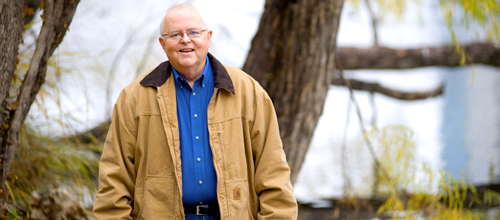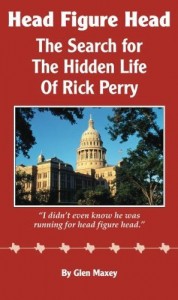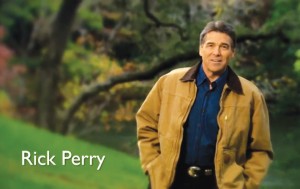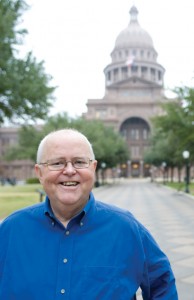
Former Texas State Representative Glen Maxey’s new book about Rick Perry has a lot of people talking. Except Rick Perry.
by Susan Bankston
Photos of Glen Maxey by Mark Hiebert
Glen Maxey came by his interest in Texas politics honestly. His family ran a traveling rodeo, and he had seen clowns, bullcrap, and goat herding long before he got to Austin.
Maxey was the first openly gay person to be elected to the Texas Legislature, where he made his presence known from 1991 through 2003 by passing more legislation in his final terms than any other single member of the Legislature. He played a leading role in passing the Children’s Health Insurance Program (CHIP) and ethics reform for the Texas House. For his contributions to progressive ideas, Maxey has received awards from Common Cause, The Human Rights Foundation, The Sierra Club, Public Citizen, Gray Panthers, Advocacy, Inc., Coalition of Persons with Disabilities, ADAPT, and many others. But his true legacy is the countless number of young people he has trained to work in politics to elect progressive candidates.
In 1982, as chief legislative aide for Democratic state Senator Oscar Mauzy, Maxey took up the cause of an HIV-infected man who was being threatened with quarantine by the Texas Department of Health. This watershed moment in the history of gay rights resulted in Maxey being outted on national TV. He left Mauzy’s staff in 1987 and became the first executive director of the Lesbian/Gay Rights Lobby of Texas (now Equality Texas).
Anyone who has spent that much time in Austin has gotten to know Governor Rick Perry. Maxey met Perry in 1985 when he arrived in Austin as a freshman legislator and freely admits that he was immediately attracted to Perry’s tight blue jeans and cowboy boots.
When Rick Perry entered the Republican presidential campaign, Maxey began getting calls from journalists all over the country looking for information about rumors that Perry is not the happy, faithfully married man he appears to be. Eventually, interest in the rumors of Perry being gay waned—as did Perry’s chances of ever being president.

Perry’s recent antigay commercial recharged the fading interest in him and his quest for the presidency. Wearing a jacket that perfectly matched Heath Ledger’s in Brokeback Mountain, Perry cut a commercial claiming that he knew America was in trouble when gays could serve openly in the military but our children can’t pray in school or celebrate Christmas. His effort to draw support from conservative Christian voters by bundling two unrelated hot-button issues—school prayer and gays in the military—backfired. His party seems to have viewed it as just another inarticulate, clumsy, and failed attempt to make a connection with American voters.
The following interview took place with Maxey a week before his book, Head Figure Head, was published.
Susan Bankston: Do you believe that Rick Perry is gay?
Glen Maxey: Throughout this story, I’ve been careful to refer to Perry’s activities as homosexual or same-sex, never “gay.” That’s because as far as I’m concerned, Rick Perry isn’t gay. He’s a man who has sexual encounters with other men. Those men predominantly identify themselves as gay. But Rick Perry is not, as far as I am concerned, gay.
Being gay is much more than just sex. Being gay is having an emotional relationship with a member of the same sex.
What’s the cover blurb about your book, Head Figure Head?
It is the story of my failed efforts to expose Rick Perry’s homosexual encounters in the national press. It’s the tale of simple curiosity aroused by a reporter’s questions about a past alleged sexual scandal, and of how complicated it is to find the answers to those questions. Over the course of my efforts to discover Rick Perry’s secret homosexual past, I learned a lot about not only many of his alleged former partners, but also the difficulty in exposing them to the wider public—particularly in a state where so many individuals’ jobs and livelihoods depend on not incurring the wrath of Texas’s longest-serving governor and his massive network of cronies, appointees, and henchmen.
What was your motivation to continue the hunt for people willing to go on the record about sexual relationships with Perry?
I’ve known about Rick’s private life for over twenty years, since random gay men shared stories with me when I was the lobbyist for the GLBT community back around 1990. Twenty years. My only response to them back then was, “Lucky guy!” Perry was inconsequential, and I had no reason to out a legislator who had never led any antigay effort in the Legislature. He voted wrong, but he represented a back-asswards district in West Texas. He was just voting his district, as we say in politics. [But his most recent attempts to] cozy up to bigots and right-wing, foaming-at-the-mouth, religious-right homophobes to set up his presidential campaign was enough to jerk me out of my retirement—where my most constructive thing is surfing the Internet in my pajamas. I have a pretty clear-cut rule on outing these days: “If you f–k the gay community in your political rhetoric and policies during the day, you don’t get to f–k the gay boys at night.”

So, was there a specific event other than the recent television commercial that got you out of your pajamas and into the hunt for evidence of Rick Perry’s sexualpreferences?
It all started when the national press called me about the “rumors” as Perry was preparing for his prayer-a-palooza and presidential announcement at a damn football stadium in Houston. At first I started e-mailing folks, just poking around for any truth to the rumors. Then it became a drama of sourcing the guys, getting them to go on record with their names. And then it became about the extraordinary lengths necessary to get this stuff published, even when the stories of Perry’s relationships with guys were more than I could count on both hands.
In the end, what kept the national media from printing the story?
I learned that you can call a politician a thief, a scoundrel, a crook, and a Republican, and the media will write it with quotation marks and exclamation marks and never think twice. But you drop stories about dozens of guys doing the nasty with the governor, and you need DNA, pictures in color and with no grainy filters, and a John Hancock on a document that really doesn’t mean shit. I thought the mere weight of the list would get a nod, but no. My book is the story of the ups and downs, the twists and turns, of trying to make all that happen.
Were you able to get anyone on the record as having had sex with Rick Perry?
This all started out as my attempt to find sources for the media to interview. I had absolutely no desire to actually write about it myself. I learned very early in working with the journalist who had undertaken the story that it did not help at all for me to chat up anyone. If the journalist didn’t hear it firsthand from the guy, it still wasn’t something that could be reported. So I became very adept at referring guys immediately to the reporter. As you read the book, you’ll see that the journalist did the first-person interviews. I spent hours, then days, then weeks, then months trying to get the main character to do an interview.
Why do you think it is that the Herman Cain story got printed but the Rick Perry story didn’t?
That story still gnaws at me. Although we all know about Cain’s women now, when Politico.com first did it, all the voices were “sources said.” At the points in the book where I think my publication was going to hit “the publish button,” I expected the same. The journalist had written the same sort of story. He had the interviews and the tapes of sources. I expected it to run, and then later there would be additional stories revealing the guys who had talked. In my book, I talk about my ideas of why the story got spiked. You know I can’t tell the ending here.
Do you believe that Perry’s arrogance or his ignorance led him to believe he could have sexual relationships without getting caught?
I may be a lot of things, but a psychosexual psychoanalyst ain’t one of ’em. A lot of people think I might be a psycho for doing this book, but I’m not the one running for president. You can just peruse “m4m” Craigslist ads and you will learn a lot about closeted homosexuals (married to women and all), who live out a second life with little concern about anyone discovering it. I’m not judging—just saying that this is not an uncommon trait among a lot of guys out there.

How did Rick Perry get to where he is today with these rumors about him floating all over Texas?
I think he’s just an ignorant, uneducated politician who has lucked his way into enriching a butt-load of people who saw the ka-ching! ka-ching! of the presidency as a continuation of their slot machine. They’d look past anything to install their boy toy into this position.
Didn’t you see the quote from a high-level Perry campaign leader in the new Politco.com e-book? “A Perry official described the rumors as ‘bullshit’: the governor has been married for twenty-nine years to Anita Thigpen—the two met at an elementary school piano recital.” What? That’s their best response? I think the American people have recently met a bunch of coaches and preachers, all married, who had sexual perversions that make me shudder. They all willfully just deny and look the other way, whether it’s a campaign for the presidency or a win for the football team.
What kind of response to your book are you expecting from the public and from Rick Perry’s campaign? And, have you hired enough lawyers?
I expect by the time your readers have made it this far through this article, they will have already either 1) agreed with Rick Perry and his handlers that I’m a crotchety old queer curmudgeon peddling bullshit, or 2) they’ve seen me in my brand-new Rick Perry Brokeback Mountain jacket on the cable news. I’ve bought one matching the one Perry wore in his antigay TV ad, just in case I get to meet my heroine Rachel Maddow. I’ll let the readers make their judgments. I was compelled to share what my research had found. And, oh, do I have lawyers lined up. They all are salivating at the possibility that I get sued and they get to do depositions under oath of Rick, Anita, and all my gay boys.
Can we have a tease from the book?
This is not a “tease,” but an important distinction that needs to be made. I will state this to my dying breath (or until and unless he declares himself otherwise): Rick Perry is not gay. For decades, GLBT activists have worked to educate the nation that we’re just like everyone else in our lives, loves, and relationships.
My investigation has identified substantial evidence indicating that Rick Perry has participated in homosexual sex acts. Random or planned, anonymous or with an acquaintance, such sex acts are not what “gay” means in today’s society. Even if Rick Perry has had homosexual encounters, I doubt that he has had emotional relationships with members of the same sex. If that’s true, he’s not “gay” as we define the term. Those relationships would not mean that he’s gay—they would just mean that he likes to have sex with men. That’s a critically important distinction.
Would you ever consider running for public office again?
The most important thing a retired politician can do is stay retired. I don’t like absolute rules, so exceptions can happen, but I’m about to start supporting only candidates under the age of 35. It’s time we have a lot of new blood in elected offices—preferably minority, women or GLBT.
Where can we find your book?
At Amazon.com, with the title Head Figure Head.
Susan Bankston lives in Richmond, Texas, where she writes about her hairdresser at The World’s Most Dangerous Beauty Salon, Inc., at juanitajean.com.










